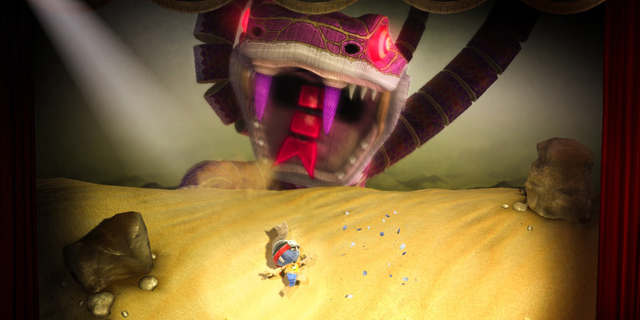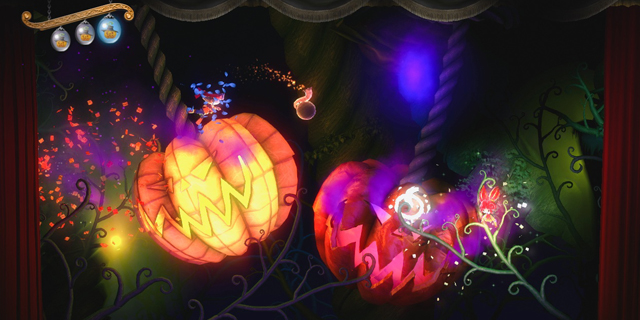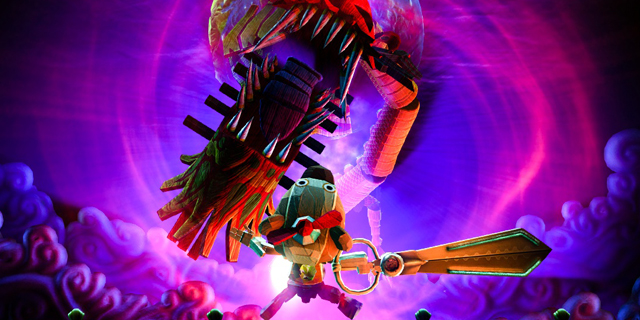When you think of traditional platformers, you most likely think of games designed with tight controls and level design created specifically to test your abilities. The game might have a distinct style or pleasant visuals, but those are far from the elements that are focused on the most. Puppeteer, the new game from Sony’s Japan Studio, wants to change that. Focusing less on spectacular gameplay and more on presenting a world full color and imagination, Puppeteer tends to value style over its gameplay hooks, for better or worse.
Right away, you’ll notice how impressive Puppeteer’s visuals are. Its theatrical style is striking in a way that most platformers don’t tend to be, helping to distinguish it from the rest of the genre as a title that does everything it can to wow you at all times. Each character, environment and moving part comes to life in immaculate detail, with the “stage” itself moving and shaking frequently to make it really feel like the highest budget puppet show you will ever see.
The writing is strong, capitalizing on the theater experience as much as possible and allowing you to believe you are in the audience, bearing witness to a stage show as much as you are interacting with one. Most of the characters speak in over-the-top fashions, including the ever-present narrator, whose verbose voice is the cherry on top of this operatic and charming adventure.

The game isn’t afraid to break the fourth wall or throw aside its theatricality for some sillier moments. Many of these moments are genuinely funny, but it does tend to value its sharp dialogue and vibrant visuals a little too much. Certain scenes drag on, making sure the point is really hammered home that yes, this is a stage show. It can entertain, sure, but it also disrupts the game’s flow occasionally just to showcase its distinct style. And yes, the narrator is as much an omnipotent voice, presenting the tale as dramatically as possible, as he is an actual person who isn’t afraid to directly interact with the characters whenever possible. This leaves you with some intermittent corny moments that feel out of place.
You might be wondering why I spent so much time focusing on the game’s presentation before even touching the gameplay. It’s hard to talk about Puppeteer without giving the game’s greatest strength plenty of attention. Having said that, this is actually a game, even if there are moments when it favors its own distinct flair over the mechanics themselves.
Puppeteer’s presentation blends in with its gameplay in remarkable ways. The level design is fantastic, constantly shifting and changing as you play to keep you on your toes. The basic controls are excellent and, the one thing a platformer needs to get right — the jumping — feels perfect. The game stands out thanks to the cutting mechanic, which allows you to move from area to area by cutting paper-like objects in the background and traveling across them as you cut. While the actual platforming is fairly standard, this one element gives the game a sense of speed (as well as verticality) that distinguishes it from other, similar games.

The hero’s main weapon, a magical pair of scissors, is also used in combat, but its use is limited, as are the enemies you face. That said, the game’s boss battles are all distinct and utilize the scissors in fascinating ways. While the bosses are fought with basic pattern recognition, the ways in which you use the cutting mechanic to take down each boisterous foe is clever. For example, once a boss is stunned, you are usually given an opportunity to “climb” up a cloth or background item using the cutting technique in order to get to the high ground and strike. These moments are undeniably fun, even if the same tricks are repeated a little too often.
The one major downside to boss encounters is how they end. Once you hit them the required number of times, you’re given an opportunity to trigger a quick-time event. This is where the game favors its own presentation over gameplay, as these QTEs feel both incredibly out-of-place and also conclude every boss fight on a sour note. It leaves you with an unsatisfactory feeling that you didn’t accomplish anything; you simply watched the game do it for you. Would it have been better if Japan Studio had just shown the fight concluding without giving you any interactivity whatsoever? Possibly not, but with the cleverness of Puppeteer’s design and inspired mechanics, you would think there would be a more creative way to end fights than that.

Puppeteer’s visual trickery both helps and hinders the gameplay, but thanks to some clever mechanics, it still stays above the line of mediocrity and stands out as a platformer worth experiencing. It’s not the finest game of its type you’ll play all year, yet it manages to both charm and surprise plenty and offer an experience unlike any other. This is one performance worth applauding.
Pros: Charming presentation, creative level design, brilliant cutting mechanics
Cons: A bit too talky at times, QTEs feel out of place



















